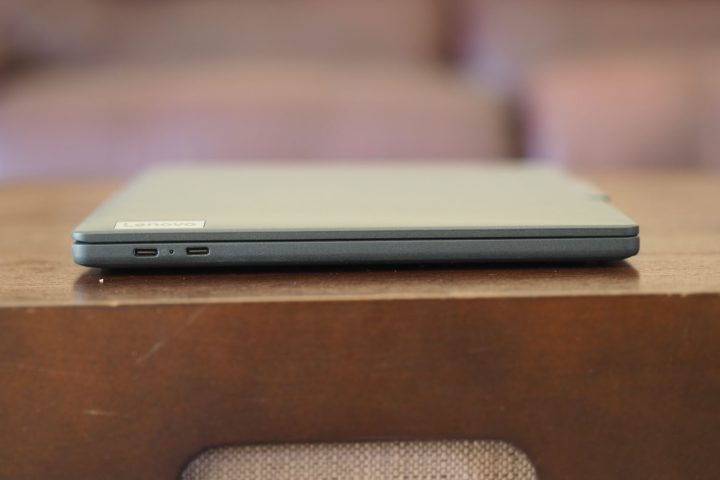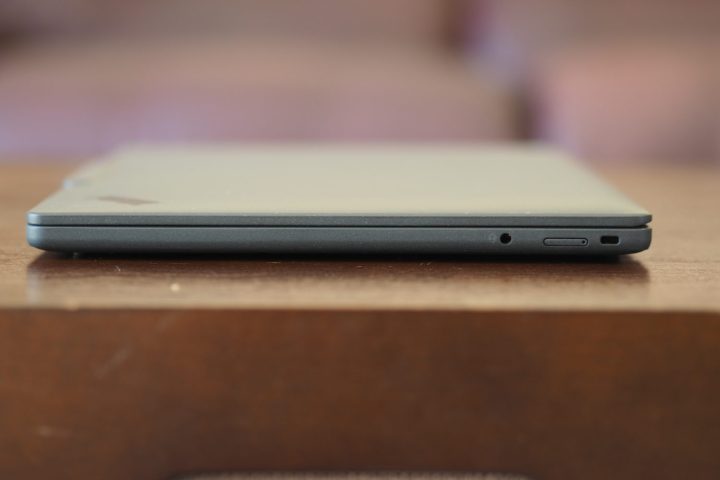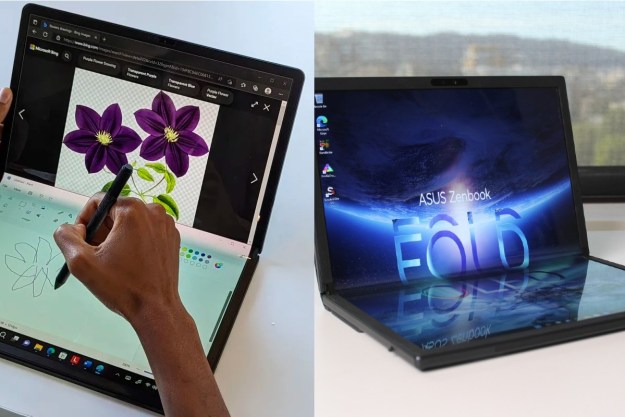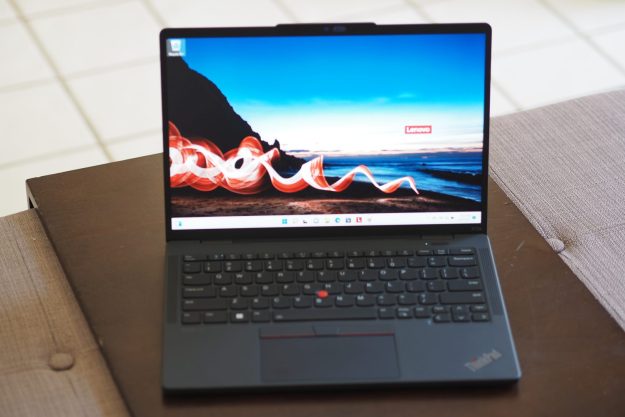
“The Lenovo ThinkPad X13s lives up to the Windows on ARM promise for battery life, but still lacks performance.”
- Solid battery life
- Quality display
- Excellent keyboard and touchpad
- 5G WWAN option
- Attractive aesthetic
- Performance lags Intel and Apple
- Some flexing in the keyboard deck
Apple’s M1 is still sending shock waves through the industry. On one hand, the ThinkPad X13s is the Windows equivalent.
Its ARM-based chip, the Qualcomm Snapdragon 8cx Gen 3, offers some of the same benefits as the M1 or M2. It’s thin and light, and the battery life is fantastic. For some, that alone makes the ThinkPad X13s an attractive choice. But due to mediocre performance, it’s yet another example of Windows on ARM
Price and configurations
As usual, there’s a significant discrepancy on Lenovo’s website between the retail price and the “sale” price. Right now, the entry-level ThinkPad X13s is $1,301 (retail $2,169) for a device with a Qualcomm Snapdragon 8cx Gen 3 CPU, 16GB of LPDDR4X
At the high end is a $1,571 (retail $2,619) configuration with the Snapdragon processor, 16GB of LPDDR4X
I’m unaware of any other business-class Windows on ARM
The Lenovo ThinkPad X1 Carbon Gen 10 is another larger laptop at 14-inches that offers the same ThinkPad experience at slightly higher prices. Finally, the HP Elite Dragonfly G3 offers an equally small and light form factor with
Design
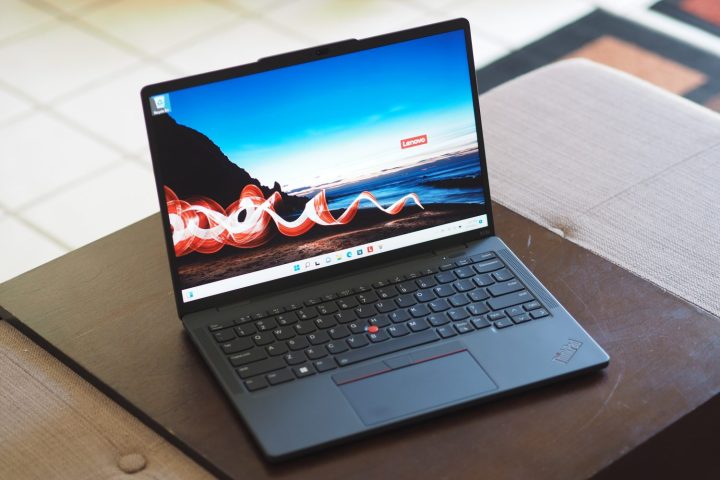
Look at the ThinkPad X13s from a distance and you’ll immediately recognize it as a member of the line. It’s all black (Thunder Black, in fact), has the red dot on the “i” in the ThinkPad logo on the lid (albeit without an LED) and on the palm rest, and the red TrackPoint nubbin stands out in the middle of the keyboard.
Up close, though, its edges are more rounded than the typical ThinkPad’s, and there’s a prominent reverse notch at the top of the display for the webcam and IR camera. These small changes make the ThinkPad X13s stand out on its own. It’s certainly more striking than the Dell Latitude 7330, which is boring by comparison.
The ThinkPad X13s is constructed of two materials, a magnesium-aluminum alloy in the lid and a glass fiber reinforced plastic in the chassis. I found the lid quite sturdy, along with the bottom of the chassis, but there was some slight flexing in the keyboard deck. It wasn’t egregious, but it was enough to keep the ThinkPad a step behind
Thanks to its lightweight materials, the ThinkPad X13s is one of the lighter
Ports and connectivity
Unsurprisingly, the laptop’s connectivity is quite limited. There are two USB-C 3.2 Gen 2 ports (no
Performance

The ThinkPad X13s is built around Qualcomm’s Snapdragon 8cx Gen 3 ARM processor, an eight-core CPU with four Cortex-A78 cores running at 2.4GHz and four Cortex-X1 Prime cores running at 2.95GHz. It’s the fastest processor Qualcomm has yet made for the PC and promises increased performance over previous generations. Its primary direct competition is Apple’s silicon, specifically the M1 and M2 CPUs that have provided class-leading performance in two iterations of the MacBook Air. Note that like Apple’s MacBook, the ThinkPad X13s is fanless and so completely quiet.
The Snapdragon 8cx Gen 3 is undoubtedly faster than its previous generation, by 86% in the Geekbench 5 multi-core test and 55% in the single-core test. At the same time, the Apple M1 is 59% faster than the ThinkPad X13s in single-core and 34% faster in multi-core, and the M2 is 77% faster in single-core and 59% in multi-core. The lowest-end Intel 12th-core CPU we’ve tested, the 15-watt 10-core/12-thread Core i5-1235U, is 44% faster in single-core and 30% faster in multi-core. AMD’s Ryzen chips since the 5000 series have also been significantly faster.
Of course, that’s just one synthetic benchmark and doesn’t tell the whole story. Unlike in previous Windows on ARM generations, I was able to run our Handbrake test that encodes a 420MB video as H.265. Of course, that doesn’t mean that Handbrake is optimized for ARM. And indeed, the ThinkPad X13s took 505 seconds to complete the process, compared to the MacBook Air M2 at 151 seconds and the Core i5-1235U at 134 seconds. I also managed to run the Cinebench R23 video-rendering benchmark, and the ThinkPad X13s scored 593 in single-core and 2,221 in multi-core. That compares to the MacBook Air M2 at 1,600 and 7,938 and the Core i5-1235U at 1,668 and 7,671.
Clearly, Qualcomm has a way to go before it catches up with Apple, Intel, and AMD. Even so, the ThinkPad X13s was fast enough during my testing for the usual productivity tasks. I could keep quite a few browser tabs open and run background apps like Outlook, Teams, and others without any noticeable hesitation. But I wouldn’t rely on the laptop for the most demanding workflows or creative tasks.
| Geekbench (single / multi) |
|
| Lenovo ThinkPad X13s (Snapdragon 8cx Gen 3) |
1,087 / 5,643 |
| HP Elite Folio (Snapdragon 8cx Gen 2) |
770 / 3,028 |
| Lenovo Flex 5G (Snapdragon 8cx) |
700 / 2,802 |
| Apple MacBook Air M1 (Apple M1) |
1,727 / 7,585 |
| Apple MacBook Air M2 (Apple M2) |
1,925 / 8,973 |
| Lenovo Ideapad Duet 5 Chromebook (Snapdragon 7c Gen 2) |
599 / 1,718 |
| Acer Aspire 5 2022 (Core i5-1235U) |
1,565 / 7,352 |
The ThinkPad X13s wouldn’t run the 3DMark Time Spy test, our primary gaming synthetic benchmark. And I didn’t see a reason to try running Fortnite, our go-to game for integrated graphics. It’s doubtful that the Snapdragon GPU can play anything more than the oldest titles (should they install and actually run) at low resolutions and graphics. And that’s OK because by no means is the ThinkPad X13s meant to be a gaming laptop.
Display

According to Lenovo, three displays are available for the ThinkPad X13s, and they are all 13.3-inch 16:10 WUXGA (1920 x 1200) IPS panels. There’s an antiglare 300-nit touch display, an antiglare 400-nit low power non-touch display, and a 300-nit non-touch display. My review unit used the latter panel, which seemed like a quality display during my testing. Colors were dynamic and natural, the display was bright enough for my usual working conditions, and blacks seemed true and not grayish.
Unlike with previous Windows on ARM
The ThinkPad X13s display is excellent for productivity workers and media consumers, but it doesn’t have quite the color width for demanding creators.
| Brightness (nits) |
Contrast | sRGB gamut | AdobeRGB gamut | Accuracy DeltaE (lower is better) |
|
| Lenovo ThinkPad X13s (IPS) |
341 | 1,380:1 | 100% | 77% | 1.12 |
| Lenovo ThinkPad X1 Carbon Gen 10 (IPS) |
411 | 1,660:1 | 98% | 76% | 1.96 |
| MacBook Air M1 (IPS) |
389 | 1,130:1 | 100% | 79% | 1.39 |
| MacBook Air M2 (IPS) |
486 | 1,310:1 | 100% | 90% | 1.08 |
| Lenovo Yoga 9i 14 Gen 7 (OLED) |
406 | 28,380:1 | 100% | 95% | 0.87 |
Two upward-firing speakers provide audio, one on each side of the keyboard. They offered adequate volume during my testing, with clear mids and highs and the usual lack of bass. They’re good enough for YouTube and videoconferencing, but Netflix bingers and music listeners will want to utilize some
Keyboard, touchpad, and webcam

Open the lid, and you’ll find the familiar ThinkPad keyboard with large, sculpted keycaps and plenty of key spacing. The switches were lighter than some ThinkPads I’ve tested, with a snappy bottoming action and a quick response that made for fast, comfortable typing. I’m not always a huge fan of ThinkPad keyboards, sometimes finding them too stiff, but this one ranked up there with HP’s Spectre and Dell’s XPS keyboards. The layout is different from the typical Windows 11 keyboard, following the ThinkPad pattern, including the left Fn and Ctrl buttons being swapped. There are several special function keys, including a couple for videoconferencing and one for opening Lenovo’s Commercial Vantage utility.
The touchpad is wider than on some ThinkPads, but it still loses some space to the buttons that service the TrackPoint nubbin. The touchpad glass surface is smooth and comfortable and provides reliable support for
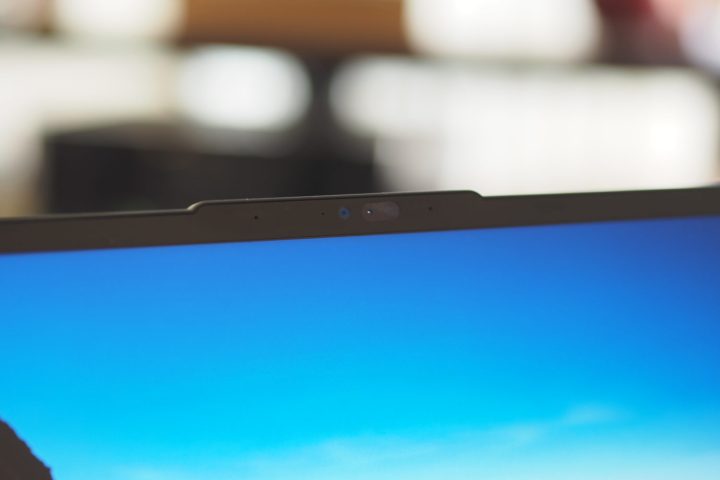
The webcam utilizes a 5MP sensor and is quite high resolution, and Lenovo uses some AI features to calibrate the color and brightness of the image regardless of lighting conditions. There are options for applying high dynamic range (
Finally, an infrared camera provides Windows Hello support via facial recognition, and there’s a fingerprint reader built into the recessed power button. Both passwordless login methods worked quickly and reliably.
Privacy and security
The keyboard includes a dedicated key for shuttering the webcam, and there’s another key for switching off the microphones.
The ThinkPad X13s is Microsoft Pluton ready, which means there’s a security processor embedded in the Snapdragon 8cx Gen 3 to protect against various threats and physical attacks. The laptop also includes Lenovo’s self-healing BIOS to recover the machine in the case of corruption or attack.
Battery life
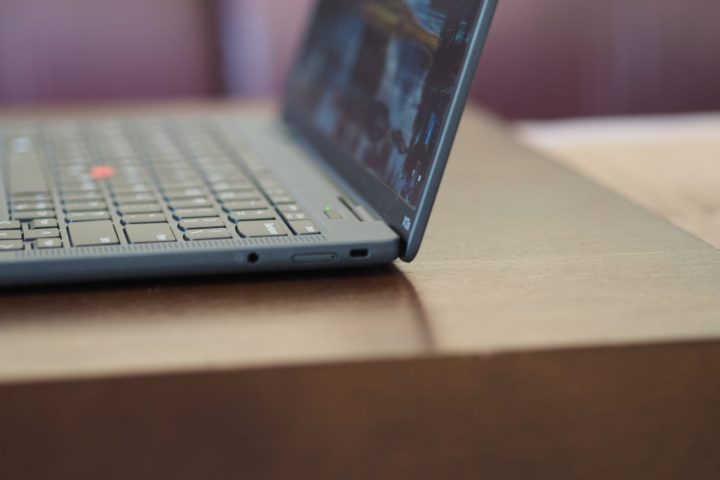
The ThinkPad X13s has 49.5 watt-hours of battery capacity, which is a decent amount for a laptop with the ultra-efficient Qualcomm ARM CPU and a Full HD+ display. It’s less than the Lenovo Flex 5G that comes in at 60 watt-hours but more than the HP Elite Folio‘s 46 watt-hours.
Take the Flex
Even so, the ThinkPad X13s provided good enough battery life that it’s worth the performance trade-off if you don’t have demanding workflows. At least, that’s true compared to the Intel field. As with performance, the ThinkPad X13s doesn’t compete as strongly with Apple’s ARM CPUs.
| that’s | Web browsing | Video |
| Lenovo ThinkPad X13s (Snapdragon 8cx Gen 3) |
11 hours, 48 minutes | 19 hours, 39 minutes |
| Lenovo Flex 5G (Snapdragon 8cx) |
17 hours, 17 minutes | 27 hours, 57 minutes |
| HP Elite Folio (Snapdragon 8cx Gen 2) |
10 hours, 52 minutes | 19 hours, 27 minutes |
| Apple MacBook Air M1 (Apple M1) |
15 hours, 31 minutes | 18 hours, 28 minutes |
| Apple MacBook Air M2 (Apple M2) |
17 hours, 59 minutes | 21 hours, 9 minutes |
| Acer Aspire 5 2022 (Core i5-1235U) |
6 hours, 25 minutes | 10 hours, 41 minutes |
Our take
All-day battery life? Check. Always-connected internet? Check. Excellent performance? Not so much. That pretty much sums up the ThinkPad X13s and Windows on ARM generally. Qualcomm and Microsoft have made some strides, for sure. The Snapdragon 8cx Gen 3 is the fastest yet, and Windows on ARM supports more apps and drivers than before. But it’s still nowhere close to Intel, AMD, or Apple when it comes to an overall experience.
For the right person, though, the ThinkPad x13s is a nicely portable laptop with great battery life. Everyone else should wait to see what’s coming next.
Are there any alternatives?
There are more
If you’re primarily looking for a thin and light laptop and are enamored of the ThinkPad brand, then the ThinkPad X1 Nano is a solid option. It’s one of the smallest and lightest
Finally, the Apple MacBook Air M2 is a highly competitive alternative for anyone who doesn’t live for
How long will it last?
The Lenovo ThinkPad X13s is built well enough that you should expect years of service. It’s questionable whether the CPU will keep up with Windows on ARM’s development, but that remains to be seen. The industry-standard one-year warranty is disappointing on a ThinkPad.
Should you buy it?
Yes, if you don’t need the fastest performance but want long battery life and
Editors' Recommendations
- Best Lenovo laptop deals: Save on Yoga and ThinkPad laptops
- The best Lenovo laptops for 2023: ThinkPad, Yoga, and more
- Why the Dell XPS 13 Plus still beats the latest competition in little laptops
- Why the latest ThinkPad X1 Yoga Gen 8 isn’t worth the upgrade
- Qualcomm claims its laptops destroy Intel chips in AI tasks

